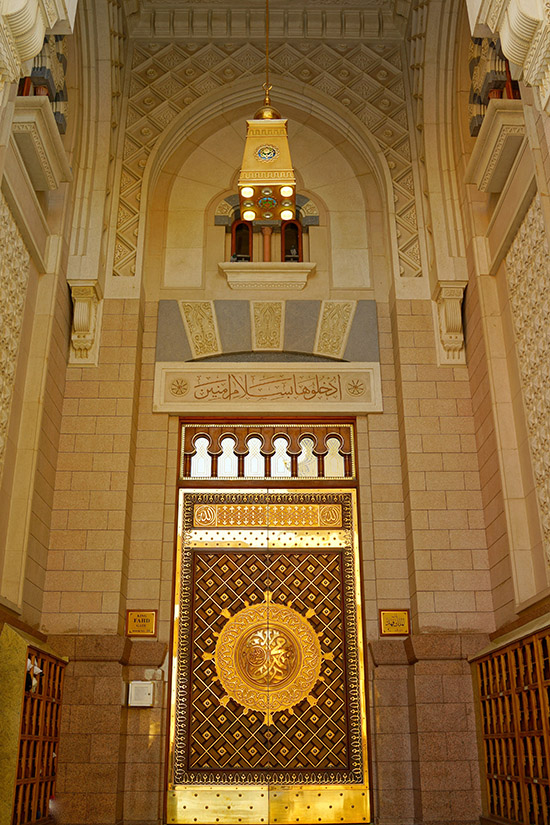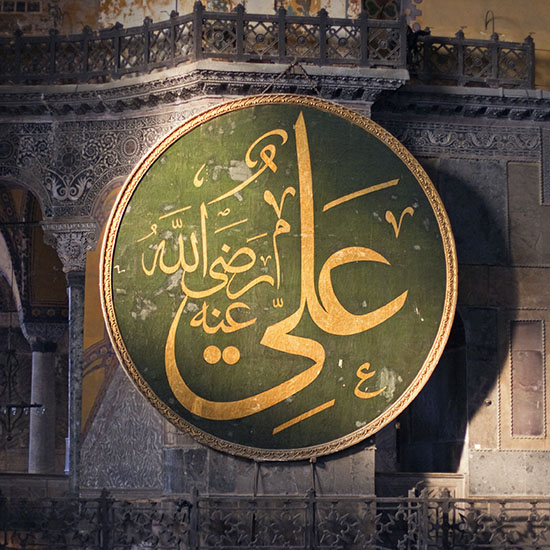Current Section: model

Lesson Belief in Muhammad (may Allah's blessings and peace be upon him)
We have a number of obligations towards the Prophet Muhammad ﷺ, including:
1 - We believe that Muhammad ﷺ is the servant and messenger of Allah, that he is the master of the earliest of humanity until the last of them. We believe that he is the seal of the prophets, and that there is no prophet after him. He delivered the message he was entrusted with, advised the people, and struggled in the path of Allah a true struggle.
2- We believe what he relayed to us, obey him in what he commanded, and stay away from what he forbade and detested. We worship Allah in accordance with his Sunnah, and emulate him and no one else. Allah Almighty says: {Surely there was a good example for you in the Messenger of Allah, for all those who look forward to Allah and the Last Day and remember Allah much.} (Al-Ahzab:21).
3- We have to put the love of the Prophet ﷺ above the love of our parents, our children and all people, as he said: “None of you believes until I am more beloved to him than his father, his son and all people” (Bukhari 15, Muslim 44). Sincere love for him comes through following his Sunnah and taking his guidance. True happiness and complete guidance can only be achieved by obeying him as the Almighty said: {But if you obey him, you will be guided to the Right Way. The Messenger has no other responsibility but to clearly convey (the command)} (An-Nur:54).
4. We must accept what the Prophet (may the peace and blessings of Allah be upon him) brought, and to be led to his Sunnah, and glorify his guidance, as the Almighty said: {But no, by your Lord, they cannot become true believers until they seek your arbitration in all matters on which they disagree among themselves, and then find not the least vexation in their hearts over what you have decided, and accept it in willing submission} (An-Nisa: 65).
5- We must beware of going against what he commanded us to, for this brings about chaos, misguidance and painful torment, the Almighty said: {Let those who go against the order (of the Messenger) beware lest a trial or severe punishment afflict them.} (An-Nur:63).
Muhammad's ﷺ message is distinguished from the previous messages by a number of characteristics, including:

1- Muhammad's ﷺ message is a conclusion to the previous messages, for the Almighty said: {Muhammad is not the father of any of your men. Rather he is the Messenger of Allah and the seal of the Prophets.} (Al-Ahzab:40).
2-Muhammad's ﷺ message abrogates all previous sacred law. Therefore, Allah will not accept a religion from anyone after the coming of the Prophet ﷺ except that they follow Muhammad (may Allah's peace and blessings be upon him). And no one will be able to attain the bliss of Paradise except through his path, for he ﷺ is the most honorable of the messengers, and his nation is the best of nations, and the sacred law that he established is the most complete of legislations. The Almighty said: {And whoever seeks a way other than this way a submission (Islam), will find that it will not be accepted from him and in the Hereafter he will be among the losers.} (Ale-Imran:85). And the Prophet ﷺ said: “By Him in whose Hand Muhammad’s soul is, a Jew or Christian who hears my message and then dies without having believed in my message, will be among those who will be among the dwellers of the Fire.” (Muslim 153, Ahmad 8609).
Muhammad's ﷺ message is a general message to all of mankind and the jinn. The Almighty relays to us the jinn's words: {O our people, respond to the Caller [i.e., Messenger] of Allah} (Al-Ahqaf:31). And the Exalted said: {And We have not sent you except to all of mankind as a bringer of glad tidings and a warner} (Saba:28) And the Messenger ﷺ said: I have been given superiority over the other prophets in six respects: I have been given words which are concise but comprehensive in meaning; I have been helped by terror (in the hearts of enemies); spoils of war have been made lawful for me; the earth has been made for me for purification and as a place of worship; I have been sent to all mankind; and the line of prophets ends with me." (Al-Bukhari 2977, Muslim 523).
Allah did not send a prophet except that his companions and disciples were the best of his followers, and their generation was the best generation of his nation. Similarly, Allah chose for His prophet Muhammad ﷺ from the best of creation---after the prophets and messengers---to be his companions. This is so they carry this religion and relay it to the people clean and pure from any adulteration to it. As the Prophet ﷺ said: "The best of my nation is the generation to which I was sent to, then the generation that follows it" (Muslim:2534).

The Definition of a Companion
A companion of the Prophet is defined as someone who met the Prophet ﷺ as a Muslim and died as a Muslim, without becoming an apostate after the death of the Prophet ﷺ.
Praise for the companions of the Messenger of Allah ﷺ, their various attributes and virtues are enumerated in several places in the Quran and Sunnah of the Prophet ﷺ. Among them are the following:
Obligations toward the Companions, may Allah be pleased with them
A number of matters are obligatory upon a Muslim with respect to the Companions of the Prophet ﷺ:
1- To love them, respect them and pray for them:
Allah praised the Muhajiroon that left their homes and wealth in Makkah and moved to Madinah for their religion's sake and to attain Allah's pleasure. Allah then praised the Ansar, Madinah's inhabitants, who helped their incoming brethren by sharing their wealth and possessions. Rather, they would even prefer their brethren over themselves. Then Allah praised the ones that will come after them until the Day of Resurrection from those who recognized the merit and station of the Companions, loved them, prayed for them, and did not harbor any hatred or malice towards any of them.
Allah the Exalted said: {For the poor emigrants [there is a due share] who were driven out of their homes and their properties, seeking Allah’s bounty and pleasure, and helping the cause of Allah and His Messenger. It is they who are the truthful. As for those who were settled in the city [of Madinah] and embraced Islam before them, they love those who migrated to them, and find no covetous desire in their hearts for what they were given. Rather they give them preference over themselves even though they may be in dire need. Whoever is protected from the greed of their souls, it is they who are successful. And those who came after them say, “Our Lord, forgive us and our brethren who preceded us in faith, and do not let there be any ill feelings in our hearts towards those who believe. Our Lord, indeed, You are All-Gracious, Most Merciful"} (Al-Hashr:8-10).
Praying for the pleasure of all of the Companions (may Allah be pleased with them):
If one of the Companions are mentioned, a Muslim should say: "May Allah be pleased with him." Allah the Exalted informed us that He is pleased with them, has accepted their obedience and deeds and they are pleased with Him for what He bestowed upon them from the blessings of the religion and this world. The Exalted says: {And the first forerunners [in the faith] among the Muhajireen and the Ansar and those who followed them with good conduct - Allah is pleased with them and they are pleased with Him, and He has prepared for them gardens beneath which rivers flow, wherein they will abide forever. That is the great attainment} (At-Tawbah:100).
The Status of the Companions:
All of the Companions of the Messenger of Allah are people of virtue and excellence, but the best of them are the four Rightly Guided Caliphs in the following order: Abu Bakr As-Sideeq, Umar ibn Al-Khattab, Uthman ibn 'Affan, and 'Ali ibn Abi Talib (may Allah be pleased with them all).
The Companions of the Messenger of Allah ﷺ are fallible humans and they commit mistakes. However their mistakes are less than the mistakes of others and their judgment of correctness is better than others, for Allah chose them to accompany His Prophet, the best of humanity, to carry this religion: "The best of my nation is the generation I was sent among, then the generation that follows" (Muslim:2534).
3- We bear witness to the justness and good conduct of all of the honorable Companions, and we enumerate their goodness and do not indulge in the mistakes that may have emanated from them, nor their individual judgments contrary to the general truth. What they bear from their sincerity of faith, good deeds, and following the religion supersedes any error. As the Prophet ﷺ said: "Do not revile my Companions, for if one of you were to donate as much as the Mountain of Uhud in gold, it would not equal a handful of what they gave, or even half of it" (Al-Bukhari 3673).
The family of the Messenger of Allah are his wives, children, and relatives from the children of his paternal uncles: The family of 'Ali, the family Aqeel, the family of Ja'far, and the family of 'Abbas, including their progeny

The best of them are those who met the Messenger of Allah ﷺ like Ali ibn Abi Talib and Fatimah bint Muhammad ﷺ, as well as their sons Al-Hasan and Al-Husayn, the two leaders of the youth amongst the people of Jannah. They also include the Messenger of Allah's wives and the mother of the believers such as Khadijah bint Khuwaylid and Aishah the Truthful, may Allah be pleased with them all.
Allah the Exalted said about the wives of the Prophet صلى الله عليه وسلم after directing them to the highest of manners and the best of conduct: {Allah intends only to remove from you the impurity [of sin], O people of the [Prophet's] household, and to purify you with [extensive] purification} (Al-Ahzab:33).
Loving the Prophet's family:
A Muslim loves the household of the Prophet ﷺ, for they are believers and followers of his sunnah. And he makes this part of his love for the Prophet ﷺ, as per the hadith of the Messenger of Allah to be dutiful and take care of his family ﷺ, and to be good to them: "I remind you of Allah with regards (of your duties) to the members of my family, I remind you of Allah with regards (of your duties) to the members of my family, I remind you of Allah with regards (of your duties) to the members of my family" (Muslim 2408). It is how a caring father says: [I remind you of] Allah [I remind you of] Allah with regards to the rights of my children.
A Muslim should absolve himself from being classified as being in one of these two categories:
The Prophet's family are not infallible:
The Prophet's family are just like other people. They can be Muslim, non-Muslim, pious, or disobedient. Therefore, we love those among them that are obedient and hope for this love's reward from Allah, and we are afraid for the disobedient and pray for their guidance. Allah's preference of the Prophet's family does not necessitate their superiority in all situations or all people that are descendants of the Prophet. People differ in many respects, and there may be others who are better and more noble.


